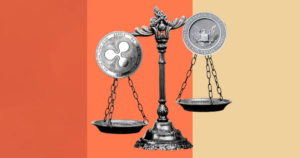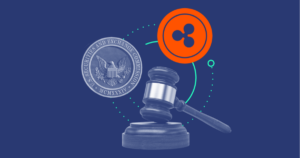In the context of the highly volatile cryptocurrency market, Ripple and its token XRP have become the focal point of attention, especially with the ongoing lawsuit between Ripple and the SEC. This lawsuit not only affects the value of XRP but also has far-reaching implications for investors and the future development of Ripple.
1. Overview of Ripple’s development and XRP
Ripple, founded in 2005 by Ryan Fugger, specializes in providing fast and secure international payment solutions. The company is currently headquartered in the United States and has built a global network connecting banks and financial institutions.
XRP, Ripple’s native coin, was launched in 2012 and quickly became one of the most prominent cryptocurrencies due to its fast transaction speeds, low costs, and high security. XRP operates on Ripple’s own blockchain platform, optimizing international transactions.
From 2013 to 2014, Ripple implemented development strategies, such as rewarding developers and incentivizing XRP transactions to expand its market. By 2015, XRP was being used by banks and financial institutions as a digital asset for payments, creating high liquidity and helping Ripple increase its revenue.
2. Overview of the SEC vs. Ripple lawsuit
The lawsuit between the SEC (U.S. Securities and Exchange Commission) and Ripple Labs revolves around whether XRP, Ripple’s token, should be classified as a security. The SEC argues that XRP is more like a security than a typical cryptocurrency, and therefore, it accuses Ripple of selling securities without registering them with the SEC as required by law.
The SEC’s reasoning is based on Ripple’s tight control over XRP. With an initial supply of 100 billion XRP, Ripple Labs holds 80 billion XRP, while the remaining 20 billion XRP is allocated to the company’s founders. Ripple has sold XRP on the market, generating $48 billion in revenue. However, the company still controls the majority of the XRP, leading the SEC to argue that investors are not just purchasing a digital asset, but are effectively acquiring a stake in the company by buying XRP, much like purchasing shares in a corporation.
Additionally, the SEC has filed a lawsuit against Ripple’s founders for generating over $1.3 billion from the sale of XRP. According to the lawsuit, over the course of seven years, from 2013 to the present, Ripple and its executives sold XRP to investors, generating massive profits. As a result, the SEC claims that Ripple and its leadership have violated securities laws by failing to register the sale of securities with the regulatory agency.

3. Ripple’s response to SEC’s allegations
Upon learning that the SEC was preparing to file a lawsuit, Ripple CEO Garlinghouse immediately criticized the move. On December 21, 2020, before the SEC officially filed the lawsuit, Garlinghouse announced that Ripple would take legal action against the SEC to protect its interests and those of cryptocurrency investors.
Garlinghouse pointed out that XRP had been issued and traded for over 8 years without any response from the SEC. He argued that if the SEC had not provided specific regulations during that period, accusing Ripple of violating current regulations was unjust. He asserted that XRP is a cryptocurrency and does not need to be registered as a security. Both the U.S. Department of Justice and FinCEN (the Financial Crimes Enforcement Network) had recognized XRP as a virtual currency since 2015, and therefore, it should not be subject to the securities registration process.
The legal battle between Ripple and the SEC has become a tense legal showdown, and the final ruling will determine the future of XRP and Ripple in the U.S. market.
4. The impact of the SEC vs Ripple lawsuit on XRP
After the SEC filed a lawsuit against Ripple, several U.S.-based exchanges temporarily halted trading of XRP, including Beaxy, CrossTower, OSL, and Blockchain.com. If the court rules in favor of the SEC, these exchanges would be required to either register as securities exchanges with the SEC or remove XRP from their trading platforms.
The value of XRP was also significantly impacted. Since the lawsuit began, XRP’s price has dropped by more than 60% on Binance since December 21, 2020. Cryptocurrency investors are concerned that if the SEC wins the case, it will have a long-term negative impact on XRP’s value and harm Ripple’s future growth plans. In response to this situation, Ripple reassured investors that it would take all necessary measures to win the lawsuit. Ripple also emphasized its commitment to expanding operations in countries outside the United States, where over 90% of its investors are based.
Despite the challenges posed by the lawsuit, XRP has shown impressive recovery. After vigorously defending itself against the SEC’s allegations, investor confidence was restored, leading to significant growth in XRP’s value. Specifically, on January 29, 2021, XRP’s price surged from $0.24699 to $0.51780, a gain of over 100%.
Moreover, Ripple continued its expansion despite the ongoing lawsuit. In 2020, Ripple processed nearly 3 million transactions through RippleNet, nearly five times the number in 2019. The company has also continued to grow its customer base, attracting interest from over 40 countries. Despite the lawsuit’s developments in December 2020, Ripple successfully signed 15 new customers and maintained relationships with over 90 major banks and financial institutions, including many of the world’s top 100 banks.
Ripple also continued to attract high-level talent from major companies like Apple, PayPal, Amazon, Tesla, and Twitter. Notably, Ripple successfully recruited Sandie O’Connor, the former Executive Director of JPMorgan Chase, to join its Board of Directors to address legal issues and accelerate development in the U.S.

5. XRP’s future Outlook
The ongoing lawsuit with the SEC is currently having a negative impact on the price of XRP. As a result, many experts predict that XRP’s price in 2021 will struggle to recover to the levels seen in 2020. Investors are advised to wait for the outcome of the legal battle between the SEC and Ripple before making any decisions.
If Ripple wins the lawsuit, the price of XRP could see a significant increase, as the coin would regain its market position. In such a case, investing in XRP could yield quick profits. However, given the current situation, the likelihood of Ripple winning the lawsuit remains uncertain, and investors should carefully consider their options before purchasing XRP.
The lawsuit between the SEC and Ripple has led to a decline in XRP’s value, creating instability in the cryptocurrency market. While this may present an opportunity to buy coins at a low price, the risks remain substantial if the court rules in favor of the SEC.
The future of XRP largely depends on the outcome of the lawsuit with the SEC. While there is potential for recovery if Ripple wins, investors need to exercise caution in making decisions within this high-risk environment.















